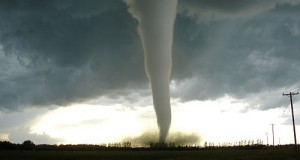If you’ve ever driven by a lake during winter in the colder states, there’s often an angler or two out there by a hole on the ice, waiting for the catch. Ice fishing has been practiced for thousands of years, but it will only yield its rewards after great patience, knowledge and skill.
Ice fishing can be done on any frozen water body. Lakes and ponds are your best bet, while rivers can be trickier. People who make good money on ice fishing have invested in nice cabins and equipment on the lake, but when it comes to survival, you’ll have to settle for the basic materials you have.
Now, here’s the truth: ice fishing can be dangerous. The ice should be a minimum of four-inches thick before you even think of setting foot on it. But even though ice fishing is risky for survival, fish are one of the best sources of protein available in the wilderness — and could be a life-saver when food is in short supply.
Despite this, don’t let your motivation for the fish overcome your better judgment; if you feel you are in danger out there on the ice, get off immediately.
Here are five tips for ensuring a successful catch:
1. Keep the Hole Covered.
If light shines through the hole in the ice, the fish will be more likely to avoid the area. Keep the hole covered as much as possible. This is especially true for shallower spots on the lake, where the light shining through will be clearer. You may not have thought fish could be so sensitive to light and dark, but they definitely are.
2. Aim for the Bottom.
Since food will be more limited to the fish in the winter just as it is for us — remember that an ice lake would prevent a fish from leaping out of the water to catch a flying bug — your best bet for catching a fish would be to lower your bait all the way to the bottom of the lake, if possible. There will be more opportunity there for your own catch.
How To Get Emergency Backup Power In The Palm Of Your Hand

ice fishing
3. Use a Bobber.
Maybe you already use bobbers as a habit for regular fishing and have one by instinct in your survival bag, so this tip may not apply to you. But for those who don’t use bobbers, now is the time to start. If you don’t have a bobber in your survival kit, you can always improvise: A straw, piece of foam or a soda can would work. The reason bobbers are necessary for ice fishing is because the fish will be less insistent due to having less energy in the winter. A bobber will be the only sure-fire way to see if you’re getting any nibbles or bites.
4. Practice Patience.
Regular fishing requires enough patience, doesn’t it? But as previously mentioned, during winter, fish lack the energy they usually have. This means they’ll be less curious for the bait at the end of your line. This translates to having to spend more time by the hole. However, patience is something that new ice fisherman sometimes lack, and this leads them to trudge back to camp in defeat … when in reality, all they didn’t do was wait long enough!
Get Dependable Backup Power Direct From The Sun
5. Stay Warm.
This is perhaps the most overlooked aspect of ice fishing. Dress warm – very warm — and wrapped in layers to prevent frostbite and chills. The only precaution to staying warm is to not have too many clothes or garments on as to where you’re not mobile enough to run off the ice fast if it starts cracking. The last thing you’ll want is heavy clothes burdening your escape.
Remember, be safe out on the ice at all costs, and good luck fishing!
What are your ice fishing tips? Share them with other readers in the section below:
 Off The Grid News Better Ideas For Off The Grid Living
Off The Grid News Better Ideas For Off The Grid Living




